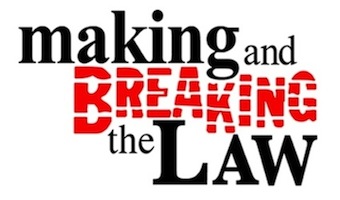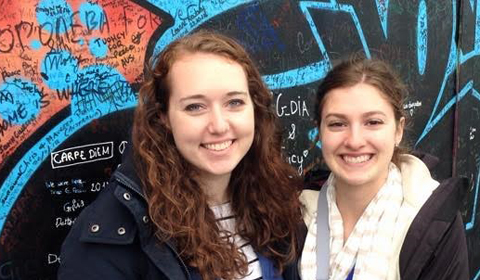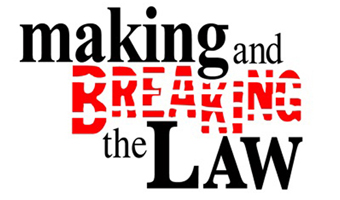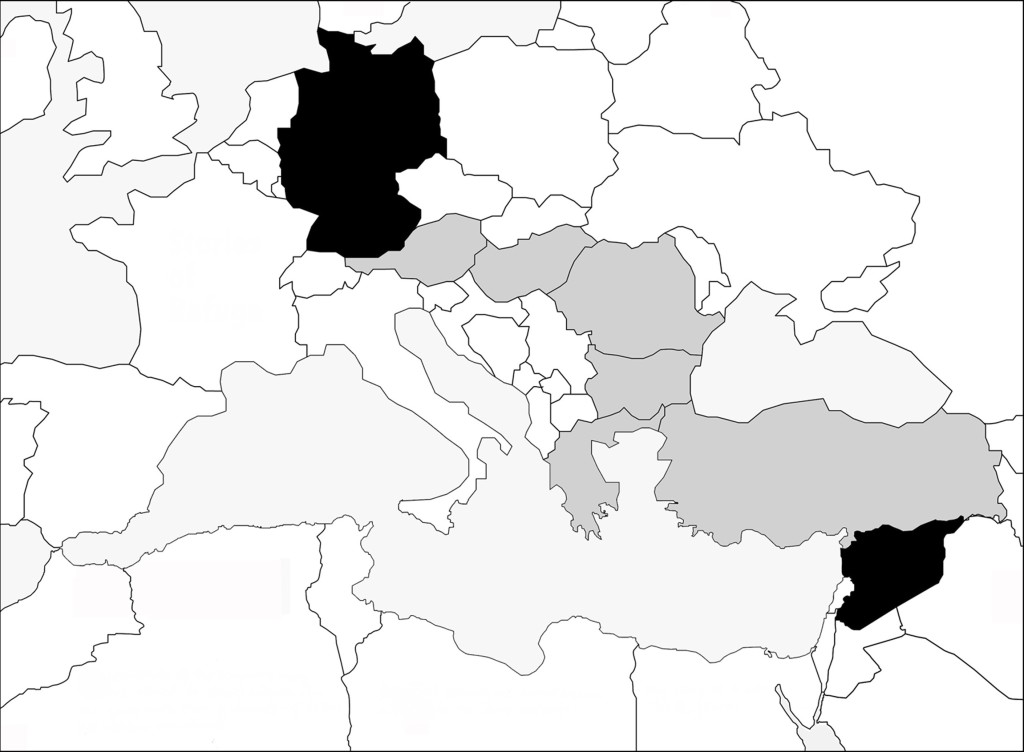The Center for Law, Justice & Culture welcomes students of all majors to sign up for the many exciting Making and Breaking the Law theme courses in Spring 2018.
Please contact theme leader, Dr. Haley Duschinski,f or more information about the theme and to receive a poster listing all Making and Breaking the Law courses offered in Spring 2018.
or more information about the theme and to receive a poster listing all Making and Breaking the Law courses offered in Spring 2018.
LJC 2000: Core Course for Certificate in Law, Justice, & Culture
Dr. Haley Duschinski, Associate Professor of Anthropology and Director of the Center for Law, Justice & Culture
Monday 6:05-8:50 p.m.
This course is provided to students who have been admitted to the Law, Justice, & Culture Certificate program. It is a core course that exposes students to sociolegal study from an interdisciplinary perspective. Students learn about the intersection of law, justice, and culture with readings in anthropology, criminology, history, interdisciplinary arts, political science, social work, and sociology. The wide range of readings provides students with knowledge of varied approaches to the study of law while demonstrating a common appreciation of the mutually constitutive relation of law and society. Through active class discussion and engagement, students form an intellectual community as part of the Center for Law, Justice, & Culture’s certificate program.
CLWR 4330: Political Islam
Dr. Loren Lybarger, Associate Professor of Classics and World Religions
Tuesday/Thursday noon-1:20 p.m.
Why have some Muslims turned to religion as a source for political identity in the contemporary world? What terms should we use to describe this phenomenon? Which individuals and groups have embraced the religio-political renewal, and why have they done so? What forms have the renewal movements taken? In what directions have they developed? What role, in particular, have modernizing states played in the instrumentalizing of Islamic institutions for purposes of control and legitimacy? How have non-state actors—the “ulama,” lay activists, social movements—responded to the conditions created by modernizing states? Addresses these questions by exploring a range of case studies in different national and cultural context—Africa (Morocco, Sudan, Somalia), Southeast Asia (Indonesia), Western Europe (France, Germany, the Netherlands), and North America (United States and Canada). Through these case studies, probe what we mean by “political Islam”—but also the politics of Islam, and what the implications are for a wider globalized modernity.
ENG 3570: Law and Literature
Tier II Humanities & Literature (2HL)
Dr. Linda Zionkowski, Professor of English and Director of Graduate Studies
Monday/Wednesday/Friday 9:40-10:35 a.m.
This course examines the relationship between law and literature, beginning by focusing on their similarities in techniques and goals before moving to an exploration of how they approach questions of justice, morality, and fairness in very different ways. The course explores how law and literature perform complementary yet often opposing functions in culture and society. Readings in literary texts explore the various ways that literature and law interact, as literature will be observed both to illuminate the workings of justice and its assumptions for readers as well as addressing flaws in legal systems, often turning readers against the laws that govern them and challenging citizen-readers to demand that their laws actually be just and equitable.
PBIO 2170: Women in Science
Tier II Cross-Cultural Perspectives (2CP)
Dr. Kim Thompson, Lecturer in Environmental & Plant Biology
Tuesday/Thursday noon-1:20 p.m.
The lives and discoveries of women scientists worldwide from 1800 to present are examined through biographies, films, speakers, personal interviews, lectures, writing, and discussion. Historical and current trends, including traditional and feminist methodologies, are considered for the sciences, science education, and society.
AAS 2900: Special Topics in African American Studies, Race and the Criminal Justice System
Dr. Daniel Moak, Assistant Professor of African American Studies
Monday 4:35-7:20 p.m.
There are currently over two million people behind bars in the United States, making up the largest prison system in the world. Racial minorities and the urban poor are disproportionately sent to prison, causing some to argue that the problem of mass incarceration is one of the greatest social injustices of our time. In this course we will draw from a wide range of sources to analyze the role of race in explaining the rise of mass incarceration and to debate different approaches to solving this social justice crisis.
LING 3880/5880: Special Topics in Linguistics, Forensic Linguistics
Dr. Michelle O’Malley, Assistant Professor of Linguistics and Dr. Sinae Lee, Visiting Assistant Professor of Linguistics
Monday/Wednesday 12:30-1:50 p.m.
This course surveys the broad field of Forensic Linguistics. Topics include the language of police and suspects (e.g. the language of “consensual” searches, interrogations, confessions, advising of/requesting right to counsel); language crimes (e.g. solicitation, conspiracy, bribery, threats, perjury, plagiarism); and linguistics as evidence (e.g. identifying anonymous authors of documents associated with criminal activity, identifying anonymous voices)
POLS 4550: International Law
Dr. Andrew Ross, Associate Professor of Political Science
Tuesday/Thursday noon-1:20 p.m.
This course studies the contribution of international law to order, power, and justice in international politics. It explores historical origins and current problems in the field, with attention to classic debates over the sources, purposes, and interests associated with international law. It places formal aspects of law (centered on the United Nations and the International Court of Justice) within the wider context of global governance, including the influence of customary international law and the work of non-governmental organizations. Discussions and readings include critical perspectives on international law as a vehicle of power in a world of inequality.
SOC 3650: Sociology of Mental Illness
Dr. Ursula Castellano, Associate Professor of Sociology
Monday/Wednesday 3:05-4:25 p.m.
This course is a study of social and cultural foundations of mental illness, including review of historic and contemporary definitions of madness and treatment of mental illness. It includes distribution of mental illness in population and social factors related thereto.; nature of commitment process and legal, moral, and social implications of commitment, and examination of legal processes pertaining to criminal insanity.



















Comments